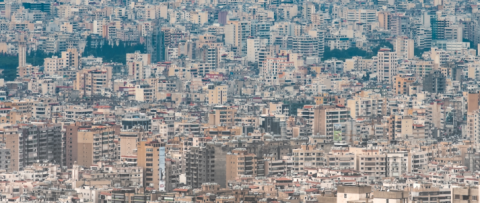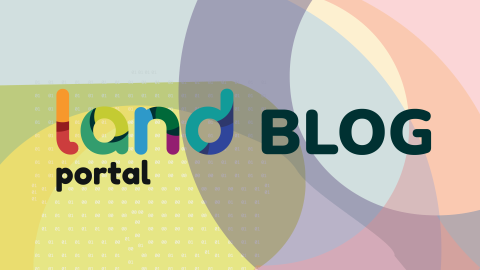Discover hidden stories and unheard voices on land governance issues from around the world. This is where the Land Portal community shares activities, experiences, challenges and successes.
 Follow our
Follow our
Sustainable Development Goals
Blog Series!
Interested in land corruption?
Follow our Land & Corruption Blog Series
for in-depth perspectives from the experts.
Issues
Geographical focus
The State of Land Data: Transforming Africa Into a Powerhouse of the Future" took place on June 22 and featured five speakers. The event was organized by the Land Portal Foundation, NELGA, GIZ and German Cooperation.
This blog post is part of the series What to Read.
After the “land rush” in 2007/08, researchers and civil society investigated the speed and scale of this phenomenon or highlighted single case studies. 15 years on, communities who lost their homes in the land rush continue to fight for their rights and get support from civil society, international organizations, and the media.
Webinar Recap:
Uncovering Land Data Opportunities in Senegal
By Laura Meggiolaro and Charl-Thom Bayer
An important precondition for good land governance is to have good land data that can be used to make informed decisions, formulate policies, and develop plans and strategies for the public good. Without solid data, modern governments are limited in their ability to carry out their functions and deliver public services – including land administration services.
Senegal has the particularity of being the westernmost point of the African continent, which is located at the tip of Almadies in Dakar, the country's capital. With an area of 196,722 km2 , Senegal is bordered by the Atlantic Ocean to the west, Mauritania to the north and Guinea and Guinea-Bissau to the south. The Gambia, a country located on either side of the river bearing the same name, forms an enclave within Senegal. The relief of Senegal is generally flat and low, with an average altitude of less than 50 metres over three quarters of the territory.
The Sarayaku people of eastern Ecuador have declared their traditional Amazonian home as Kawsak Sacha — a living forest with rights.
On Mindanao, in the Philippines, the Manobo people have created a local and regional governance structure for their lands, including Bagani, or warriors, to police the area against logging and poaching.
Across East and West Africa, IIED and partners have been developing and testing approaches to strengthen women’s voices in local land governance. Philippine Sutz reflects on the role and impact of local governance frameworks as these approaches are implemented in different contexts.
Since 2016, IIED has been working with local partners across East and West Africa to strengthen rural women’s voices in local land governance.
The assumption underpinning this work is that when local women actively participate in land governance, related structures are more likely to recognise and defend women’s interests. This leads to fairer land relations and women having greater control over their livelihood options.
In each country where the project has been implemented – Tanzania, Ghana and Senegal – local partners have developed, strengthened or scaled up approaches to support local women to enter the political space and participate meaningfully in local decision-making processes on land allocation and use.
While tailored to address local contexts and needs, the approaches developed in each country share similarities: None of them ‘reinvent the wheel’ but build on existing governance arrangements; they are bottom-up and participatory, involving community dialogue and capacity building exercises; and they all seek to ensure that decision-making bodies on land include a minimum number of active women members and promote local dialogue.
But the approach design was different to recognise the opportunities and gaps associated with each country’s land governance framework.
Tanzania and Ghana: local level governance fosters local ownership
In Tanzania, the law establishes local authorities with power to administer land at the lowest administrative level: the village. The village council and village assembly play a key role in local land governance – they have the power to allocate land and make decisions on land use.
In Ghana, land is governed customarily by traditional authorities, and land governance rules vary from one area to another. In the area where our project was implemented – the Nanton Traditional Area – community chiefs are given power to administer land.
In both countries, the local governance systems enabled our partners to embed their approaches directly at the community level and ensure local ownership.
In Tanzania, the Tanzania Women Lawyers Association (TAWLA) worked directly with village authorities to support the adoption of gender-sensitive village by-laws promoting the participation of women in village level decision-making processes. The process received good support from local communities.
In Ghana, NETRIGHT and the Grassroot Sisterhood Foundation (GSF) worked with local community chiefs – the lowest traditional administrative unit – to establish Community Land Development Committees (CLDCs). These committees are designed to support chiefs in making decisions on land and ensure that such committees had women members.
Senegal: challenges at municipal level
In Senegal, meanwhile, public land is managed by the local governments of municipalities – and community land is allocated at the local level through the municipality. A ‘municipality’ includes between around 30 and 60 villages; this is a higher ‘administrative level’ compared with land governance in Tanzania or Ghana.
The authorities administering land are the municipal council through the land commission – a local body supporting the council’s decision-making process.
Our partner IED Afrique worked in Darou Khoudoss to support the inclusion of women in the land commission and the adoption of a local land charter promoting women’s participation in land governance.
Working at the municipal level – rather than directly in villages – has proved more challenging in terms of local ownership. IED Afrique developed additional activities to ensure buy-in at village level. In particular, they collaborated with local women’ groups to make sure that the project was reaching women in villages.
In Tanzania and Senegal, land being governed by national laws makes it easier to replicate and scale up approaches. In Tanzania, TAWLA was able to reach all 64 villages in the Kisarawe District. Replicating the approach across different regions in Ghana would have meant adapting it to each regional context, which would have been cumbersome and resource intensive.
Takeaways for policymakers
Comparing land governance frameworks (PDF) in the three countries shows how their nature – and in particular the existence (or lack) of heavily decentralised power on land – determines, to a degree, the administrative level where the intervention takes place. This impacts how easily participatory and inclusive bottom-up approaches can be implemented.
Local authorities having power over land at the village or community level – as in Tanzania and Ghana – is a real advantage, as it allows approaches to be embedded in the very communities they’re trying to support. When land is governed at a higher administrative level – as in Senegal – additional efforts and resources are often needed to ensure local ownership of the approach.
In wider terms, my sense is that the more decentralised a land governance framework, the better for democratic, participatory processes to take place and ultimately, for how local women’s voices can be reflected in decisions made on land administration. This should be kept in mind by governments undertaking land governance reforms.
This blog was originally posted on the IIED website and is the fourth blog in a series looking at ways to strengthen women’s access to and control over land in Africa.
In February of this year, a deportation officer of the United States Immigration and Customs Enforcement (ICE) agency was indicted for extorting immigrants for cash and sexual favors. Arnaldo Echevarria promised two undocumented women “working papers” in exchange for sex, eventually impregnating one of them.
This is just one example of the many cases of sextortion that vulnerable women, and sometimes men, face around the world.





